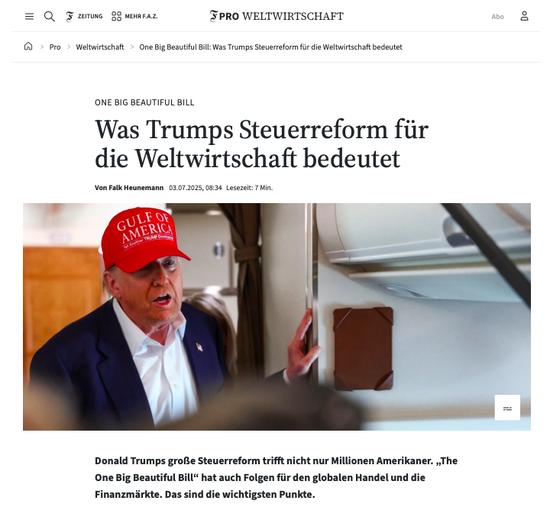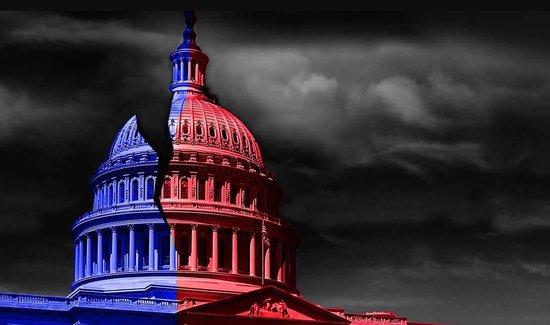

At 2:25 PM Eastern Time on July 3rd, President Trump’s massive tax cuts and spending bill, known as the “Bigger, Better, Faster” Act, was finally passed by the House of Representatives.
For many days, American politicians have been adding layers to the political drama, continuously playing out a series of “political circuses” in the political arena. However, behind this bill lies the cost that America will have to pay.
Before Final Vote, Democrats Delay Record-Breaking Speech Length
Just before the House began its final vote on the bill, at 4:53 AM Eastern Time on July 3rd, Democratic Leader of the House of Representatives, Jeffries, initiated his last delay speech to prevent the passage of the “Bigger, Better, Faster” Act.
△On July 3rd, Democratic Leader of the House of Representatives, Jeffries, delivered his last delay speech.
The reason for Democrats taking such measures is that just over an hour ago, the Republican-controlled House of Representatives advanced the “Bigger, Better, Faster” Act with a narrow margin of 219 votes in favor and 213 against, passing procedural rules. Jeffries had no choice but to engage in a lengthy speech to delay the final vote, hoping to secure support from his party colleagues from Republicans.
Jeffries’ speech lasted about 8 hours and 46 minutes until around 1:39 PM that day, after which it concluded. This speech duration set a new record for the House of Representatives, surpassing the long speech by California Republican Kevin McCarthy in 2021, which lasted 8 hours and 32 minutes.
However, shortly after Jeffries finished his speech, the House still proceeded with the vote on the bill, ultimately passing it with 218 votes in favor and 214 against. The bill has been controversial due to its implications of federal aid reductions, increased long-term debt, and tax cuts for the wealthy and large corporations. Two Republican members voted against the bill during the vote.
This bill was previously approved by the Senate on July 1st.
The White House announced on the 3rd that Trump is set to sign the bill on the 4th, which coincides with America’s “Independence Day”.
A Bill Provokes a “Political Carnival” Series
Regarding the “Big and Beautiful” bill, the United States has been experiencing multiple “political carnival” episodes in recent days. This includes but is not limited to significant disagreements over the bill, leading President Trump to become enraged and continue his verbal war with former campaign ally Musk; the Democratic Party’s ongoing opposition to the bill causing numerous delays at Capitol Hill; and several Republican lawmakers turning against the bill mid-vote, highlighting internal divisions within the party…
Shortly after resigning from the “Government Efficiency Department” at the end of May this year, American entrepreneur Musk has repeatedly criticized the “Big and Beautiful” bill in public. Trump has also responded with harsh words multiple times.
Musk: “Nauseating”, Proposes New Party, Then Backtracks and Apologizes
Trump: Disappointed, He’s Mad, Threatens to Halt Government Contracts
Initially, Musk’s criticism of the bill was relatively mild, only criticizing it as difficult to balance during a media program. However, his language became more explicit, including terms like “nauseating” and “betrayal”, and even stated his intention to form a new political party. He once implied that Trump was involved in the Epstein case, but later deleted the post and claimed his criticism was too severe. Trump’s response ranged from open expressions of disappointment towards Musk to directly stating “Musk is mad” and threatening to halt government subsidies and contracts for his companies, culminating in a hasty end to their first public spat.
Musk: Sneak Attack on the Republican Party as “Pig Party”
Trump: Considers Deporting Musk
However, as the bill continued to advance, Musk criticized the bill again at the end of June, posting several social media posts on the platform and once again threatened to create a “United States Party” if the bill passed. Additionally, he slyly referred to the Republican Party as the “Pig Party” (PORKY PIG PARTY).
Trump directly stated that Musk received more subsidies than anyone else, threatening to investigate Musk’s own businesses if he had ever served in the “Government Efficiency Department,” and even threatened to expel Musk from the country.
According to Reuters, this dispute sparked by the “Bigger is Better” bill occurred between “the most powerful person in the world” and “the richest person in the world.”
Regarding the Democrats, due to their current lack of dominance in both the Senate and the House, they have repeatedly resorted to the strategy of dragging their feet to resist the “Bigger is Better” bill.
Senate Reads the Bill for 16 Hours
In the late hours of June 28, after a vote with a slim margin of 51 to 49, the Senate passed a procedural vote aimed at advancing the “Bigger is Better” bill. New York Democrat Chuck Schumer, the minority leader of the Senate, announced that the Democratic Party would force the reading of the nine-hundred-page bill in the Senate.
This reading lasted for 16 hours. It wasn’t until around 3 p.m. on June 29 that the text of the bill was finally read out, entering the Senate debate phase.
The Two Parties Face Off Again in a “Whiteboard Battle”
During the debate, the two parties continued their skirmishes. The Republican Party took the lead by using a “whiteboard” to argue that the bill could save money. The Democrats, following suit, also used a “whiteboard” to argue that the bill was “fake savings, real bankruptcy.” This “whiteboard battle” between the two sides continued into the early hours of June 29.
Another Long Day of “Marathon” Deliberations
After the two parties finally concluded their debate in the Senate, they entered another long “marathon” session. According to the Associated Press, during this marathon meeting on June 30, senators from both parties could propose an unlimited number of amendments, each of which required a vote from all senators.
Three Republican Senators Switch Votes, Vice President Wes Casts the Key Vote
After multiple rounds of amendment proposals, vetoes, and re-proposals, the United States Senate finally passed a bill on July 1. The vote was initially a tie with 50 votes in favor and 50 against due to three Republican senators switching their votes. Ultimately, under the voting of the Republican vice president serving as the Senate leader, the bill advanced to the House of Representatives by one vote.
The political spectacle surrounding the “Bigger is Better” bill has now come to an end. The bill is only a matter of presidential signatures away from becoming law. However, according to various analyses, the consequences of this bill will follow Trump’s official signing.
U.S. Society: Rich Get Richer, Poor Get Poorer
Analyses indicate that the “Bigger is Better” bill significantly reduces taxes on the wealthy and businesses, as well as cuts nearly $300 billion from the U.S. federal government’s “Supplemental Nutrition Assistance Program.”
The nonpartisan Congressional Budget Office estimates that this plan will increase the deficit by approximately $3.3 trillion over the next decade and result in 11.8 million people losing their health insurance coverage.
Professor Wang Jinbin from the School of Economics at Renmin University of China pointed out that significant reductions in spending on people’s livelihoods, especially health insurance, will further widen the wealth gap.
Escalating the Already High National Debt
Despite the so-called “Bigger is Better” bill containing spending reduction measures, budget agencies and economists generally believe that these measures are unlikely to effectively offset the revenue loss caused by tax cuts and other policies, as well as the increased spending on defense and other expenses. It is expected that the bill will significantly increase the federal debt.
Impacting Global Energy Transition and Intensifying Global Financial Instability
Wang Jinbin also noted that the bill overall reflects a selfish approach of “America First.”
其中,大幅度削减绿色能源方面的补贴,将会影响全球能源绿色转型,对全球的经济结构也会产生冲击。
△德国《法兰克福汇报》发表文章:特朗普的税收改革对世界经济意味着什么
德国《法兰克福汇报》3日发表评论文章称,“大而美”法案将加剧美国债务上限争议,推高市场对美国财政信用的担忧。倘若投资者对美国偿付能力信心动摇,可能引发美元贬值、资本流动不稳甚至全球金融系统风险上升。
中期选举共和党将承压 美政治极化加剧
在中国人民大学国际关系学院教授刁大明看来,当前美国持续围绕“大而美”法案上演的“政治马戏”正是美国政治极化的体现。而法案通过后,将进一步激化美国两党间的对立。民主党当前显然会将“大而美”法案当作2026年美国中期选举时的重要攻击对象。刁大明指出,如果明年美国经济持续不理想,该法案将成为民主党攻击共和党最好的工具。
尽管“政治马戏”随着法案在国会通过谢幕,但上述的这些代价,美国政府和美国全社会需要在未来数年,慢慢支付。